Jeff Vinik has returned to his hotel suite for a 30-minute respite.
The popular 58-year-old chairman and governor of the Tampa Bay Lightning is between meetings with the NHL's Board of Governors on an early December afternoon in Manalapan, Florida. Stacks of papers cover the table near the living room, some neatly piled, some strewn about, all important to any number of his business ventures. The Sports Business Journal is sitting next to the stacks of papers. His laptop is open to the NHL.com stats page. Lightning forwards Nikita Kucherov and Steven Stamkos are at the top as the League's leading scorers with 40 and 38 points, respectively.
Lightning owner building legacy of winning, community involvement
NHL All-Star Weekend chance for Vinik to showcase investment in team
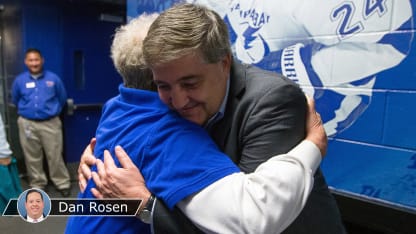
It's a scene that speaks to who Vinik is and what he's all about.
Vinik's work is his passion. His passion led him to move his life and his fortune to a city he believes is full of untapped potential and resources, a city he believes in.
"I am shameless about selling Tampa and Tampa Bay," Vinik said.
A decade ago, Vinik, who grew up in New Jersey as a die-hard fan of the New York Rangers, was someplace else entirely, seemingly worlds away from Tampa and the NHL.
He was in Boston with his wife, Penny, and children Danny, Jared, Kyra and Joshua. He built a fortune through his successful hedge fund management, both with Fidelity Investments from 1992-96 and his own hedge fund, Vinik Asset Management.
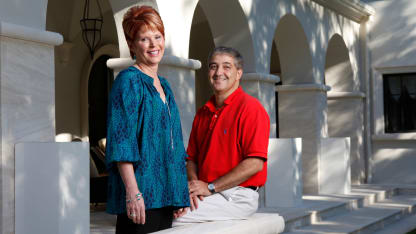
Vinik was also close to turning 50 years old, a point when many people re-evaluate where they are and what they're doing. He thought back to one of his first loves, hockey, the NHL.
He decided to buy a team. He chose the Lightning because he saw opportunity. He didn't see what his investment would become. No one did. No one could.
"If you had told me 10 years ago I'd own a hockey team, live in Tampa and be partners with Bill Gates, I'd say, 'You've got to be kidding me, who is this person?' " Vinik said. "I bought a hockey team eight years ago because I love the sport. I moved to Tampa Bay because I liked it, I thought it had great potential, and that's where the hockey team was. Who knows eight years from now the conversations we're going to be having related to what's going on there, but I lived in the New York area for 25 years and lived in the Boston area for 25 years; great cities, but I can't move the needle in those cities. Tampa Bay, the Lightning, our real estate company, we can absolutely move the needle in this area. That's a great thing to wake up to every day."
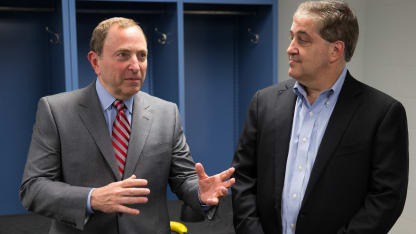
© Scott Audette/Getty Images
Vinik is waking up to demands that few, if any, owners have. He wouldn't have it any other way.
In addition to owning and operating the Lightning, who have become the model franchise for the so-called nontraditional markets with their success on the ice and investment in the community, Vinik is working on a $3 billion real estate investment he made with Cascade Investment LLC, the money management company operated by Gates, the founder of Microsoft who is worth $86 billion, according to Forbes magazine. The plan is to revitalize the 50 acres of property surrounding Amalie Arena, the Lightning's home, into a mixed-use district featuring shopping, restaurants, hotels and office space.
"Tampa has to have a Jeff Vinik," said Steve Yerrid, one of Tampa's top trial lawyers and leading philanthropists. "If Tampa is to enter this century with an impactful statement of this is the place to be, a community leader like Jeff Vinik is not only desirable, he is essential.
"He is a one-man attraction for this area."
Vinik will put Tampa and his investments on display for the hockey world as the host of the 2018 Honda NHL All-Star Weekend (Jan. 27-28), including the 2018 Honda NHL All-Star Game (Jan. 28; 3:30 p.m. ET; NBC, CBC, SN, TVA Sports).
Be prepared to see state-of-the-art amenities, a world-class operation, cranes dotting the skyline and an owner showing visitors why he picked this place to make dreams come true.
"When Jeff Vinik purchased the Tampa Bay Lightning the franchise had certainly seen better days," NHL Commissioner Gary Bettman said. "Jeff's commitment to hockey, to the Lightning and to the greater Tampa region, and his willingness to devote substantial resources to the effort is what has made the Lightning a great organization and Tampa a terrific hockey town."
Embracing Tampa
Vinik's philosophy is that an owner of a valuable sports team must be a part of the fabric of his community, that if he wants his customers to believe in him, he needs to invest in them.
For Vinik, it started with a commitment and investment in the Lightning, who were languishing in the red when Vinik acquired them in March 2010; they were 21st in NHL average attendance per game (15,497) in 2009-10, according to the Elias Sports Bureau, with approximately 3,000 season ticket holders that season.
The Lightning hadn't won a round in the Stanley Cup Playoffs since winning the Stanley Cup in 2004. They didn't make the playoffs from 2008-10. They went from third in NHL average attendance in 2006-07 (19,877) to 21st in three seasons, according to Elias.
Vinik's first major hire was general manager Steve Yzerman on May 25, 2010. He gave Yzerman, a Hall of Fame player with the Detroit Red Wings, the autonomy to run the team as he sees fit and the necessary resources to make it happen.
The Lightning went to the Eastern Conference Final in 2011, but with Vinik's backing, Yzerman put them through a rebuild that included a coaching change on March 25, 2013, from Guy Boucher to Jon Cooper, who will coach the Atlantic Division in the All-Star Game.
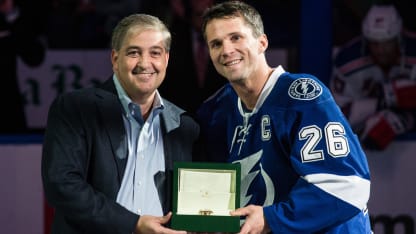
© Scott Audette/Getty Images
The Lightning failed to qualify for the Stanley Cup Playoffs in 2011-12 and 2012-13, but Yzerman was building the product with Stamkos and defenseman Victor Hedman as the centerpieces.
Cooper led Norfolk to the American Hockey League's Calder Cup championship in 2011-12. On that team were forwards Tyler Johnson and Ondrej Palat, who debuted with the Lightning in 2012-13. Kucherov, selected by Tampa Bay in the second round (No. 58) of the 2011 NHL Draft, arrived the following season, when Yzerman traded Martin St. Louis, the all-time leading scorer in Lightning history, to the New York Rangers for Ryan Callahan, who signed a six-year contract with Tampa Bay in June 2014.
The Lightning made the playoffs in 2014, but didn't win a game. They reached the Stanley Cup Final in 2015, losing in six games to the Chicago Blackhawks. They went back to the Eastern Conference Final in 2016 before losing in Game 7 against the Pittsburgh Penguins, the eventual Stanley Cup champions.
Stamkos signed an eight-year contract June 29, 2016, two days before he could have become an unrestricted free agent. Hedman signed an eight-year contract extension on July 1, 2016, the same day goalie Andrei Vasilevskiy signed a three-year contract extension.
All three and Kucherov were selected for the All-Star Game. Hedman is injured and likely won't play.
The Lightning, who didn't make the playoffs last season, lead the NHL with 65 points.
Stamkos, Callahan, Palat, Johnson, Hedman, Vasilevskiy, forward Alex Killorn and rookie defenseman Mikhail Sergachev are signed for at least the next two seasons. Kucherov is signed through next season.
The Lightning have operated at 100 percent capacity with an average of 19,092 fans per game since 2015-16.
"[Vinik] has been great to work for," Yzerman said. "As a boss, he's been incredibly supportive of the hockey operations department reassuring in our decisions and supportive of the direction and ideas we have and the decisions we make along the way."
Vinik's investment in the brand included more than $80 million of private money going into publicly owned Amalie Arena, according to the Lightning.
Vinik is also in the process of a privately funded $7.5 million renovation to the Lightning's practice facility in suburban Brandon, Florida, to feature a new locker room, gym, rehab facility and medical rooms.
"We're striving to have the best in every area or be amongst the best in every area," Yzerman said.
While Vinik was boosting the Lightning's resources, he was also becoming a source of pride and of motivation for the people who work for him.
"We owe so much to him," Hedman said. "We want to live up to his standard. He's giving us all the tools to be successful and he's just an amazing human being that's done a lot in this community and for our team. We want to make him proud every night we step on that ice."
Vinik's plan to put the appropriate resources into the team and building coincided with his call for community service in Tampa.
At the 2010 Vancouver Olympics, prior to Vinik officially taking ownership, he and former Lightning chief executive officer Tod Leiweke had the first of several conversations that led to the birth of the popular Lightning Community Heroes Program.
The program started in 2011, and at 294 consecutive home games since, the Lightning have honored a local person who has given his or her time and/or money toward making the Tampa area a better place, and Vinik buttresses the honor by donating $50,000 to a nonprofit charity of the Community Hero's choice.
Vinik has so far donated $14.8 million to more than 300 different nonprofits in the area, according to the Lightning. He has pledged to donate at least $20 million.
"I get to see these heroes before every home game, meet them, take a picture with them, and then they get the whole second TV timeout of the game to honor them," Vinik said. "We talk about their stories, the charity they're giving to. It's fantastic for a grass-roots organization throughout the region. It's fantastic to inspire other people, 20,000 other people in the building. It's shown on TV. We always show it in the second intermission. Let's inspire other people to give or start charities or participate their time."
The inspiration has spread through the organization.
"People want to be involved," Yzerman said.
Hence, the Lightning's successful a program called CHARGE, an acronym for Contributing Hours Across our Region through our Generous Employees.
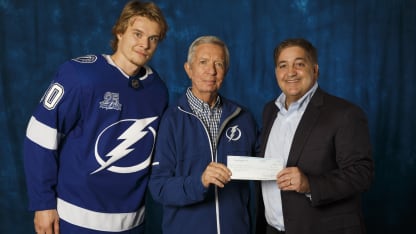
© Scott Audette/Getty Images
On the company's time, each Lightning employee is asked to do 40-50 hours of community service time per year. The employees volunteer between 4,000-5,000 hours each year.
In addition, pediatric cancer patients and their families use the Ryan Callahan Foundation Suite every game, and Callahan's foundation offers a Make-a-Wish style program for one such family per month.
Stamkos said he's in the early stages of planning his own philanthropic program. Hedman is working with the Lightning on one too. Others are expected to follow.
"It's important to us," Hedman said. "The community supports us, so we've got to support them."
The Lightning are growing the local hockey community through the Lightning Made program, which began in 2015. They have donated more than 70,000 street hockey sticks with the Lightning logo to kids in the community and plan to build 10 street hockey rinks in the next three years.
"We want every kid to have a stick," Vinik said. "We want everybody to be exposed to the Lightning. And we feel it. We see it."
Vinik convinced former Tampa Bay GM Jay Feaster, who helped build their 2004 Stanley Cup championship team, to return to the Lightning as the executive director of community hockey development.
Feaster, also a former Calgary Flames GM, said Vinik is the reason he returned to the Lightning in the community capacity. He said it's routine for him to drive through neighborhoods and see kids playing hockey in driveways and parks.
"The Lightning brand in this market right now is so incredibly strong," Feaster said. "We especially see it because we go across the community. We're not just focused on people who are Lightning fans, we're trying to make people Lightning fans. We continue to see more people embracing the game and we believe that it is due in large part to the fact that it's pretty tough to turn on the TV or radio or pick up a newspaper and not see some discussion of all of the different things that Jeff is doing."
Feaster said one obvious sign of Vinik's impact is the increase in Tampa-area players registered through USA Hockey. Registration has gone from 1,100 three years ago to nearly 1,900 at the end of last season.
"That doesn't count the fact that last season, 2016-17, we had 300 youngsters between the ages of 4 to 8 sign up for Learn to Play," Feaster said. "This year, we have 400 kids between the ages of 5 to 9 registered. Those 700 kids are not included in the USA Hockey numbers yet."
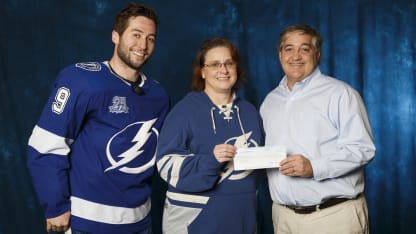
© Scott Audette/Getty Images
The Lightning also sponsor a 17-team high school hockey league that includes six junior-varsity programs. The goal is to increase that number to at least 10.
"What's truly amazing to me is when I came back here in July 2014 my observation, and it's still this today, is that the people came into [Amalie Arena] every day looking to do the best they could for Jeff Vinik because they wanted to see Jeff Vinik succeed," Feaster said.
To that end, Vinik said the Lightning's staff turnover rate has gone down dramatically in his eight years of ownership.
"I think people in general enjoy working with us," Vinik said. "We've got a good thing going right now, but you know, we've got to keep the hot dogs hot and hopefully have a good team on the ice. It's a cyclical business in that respect, but we have to keep our customer service up."
The Lightning's bottom line is strong. Their season ticket base is 14,700 this season. There was a 90 percent renewal rate this past offseason even though Tampa Bay didn't make the playoffs.
All 68 suites in Amalie Arena are sold out. Vinik estimated that less than 33 percent of them were sold when he bought the team.
"You want a guaranteed standing ovation at a game, show a picture of Jeff Vinik sitting in his box," Feaster said. "In my mind, there's nobody in the game who deserves and who I want to see hoist the Stanley Cup more than Jeff Vinik."
Investing in Tampa
If you're Vinik, what better way to immerse yourself in your new city than to make a significant financial investment in its infrastructure, commerce and future?
"It's become our mission to really try to help transform a city, do our part," Vinik said.
Vinik began by buying parcels of land around Amalie Arena, mostly surface parking lots with high development potential. He didn't have a plan for them initially, but he knew they would be valuable pieces of developed property in a historically underdeveloped area.
Yerrid said that when he was growing up, the waterfront area around where the arena is located, known as the Channelside District, was full of freight ships, merchant marine vessels and cargo transactions.
"It was dead in terms of any type of commerce or any type of enhancements of the arts or culture," Yerrid said. "Vinik has brought a new vision to that area."
Vinik said it started as a $1 billion vision aimed at taking advantage of the movement of the millennials and empty nesters back to the urban core, to the downtown area. Vinik, though, leveraged his contacts to partner with Cascade to turn it into a $3 billion redevelopment project.
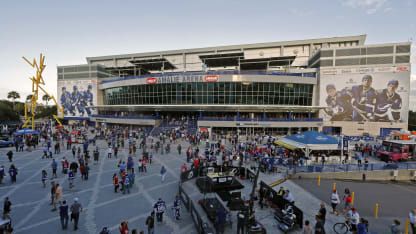
© Mike Carlson/Getty Images
Tampa mayor Bob Buckhorn estimates thousands of jobs will be coming to the area in the next five years, but a longer-term outlook has it becoming a destination for startups and corporate relocations, both mentioned by Vinik as targets of opportunity.
Vinik said he and his partners are also working on improving Tampa's mass transit system.
"It's not just the short-term construction jobs, it's the long-term sense of place, community-building and destination that will drive a lot of other decisions by a lot of other developers and interests," Buckhorn said. "Obviously, it benefits the Lightning and really builds a district around the arena, but what is going on around here in Tampa is bigger than the Lightning and Amalie Arena. It's recreating and building an entire new neighborhood."
Buckhorn said Vinik's involvement has brought credibility to the Tampa market.
"He is obviously widely renowned as a stock picker and a hedge fund guy, so he and the folks at Cascade, that combination, gives us a lot of credibility in the financial world," Buckhorn said. "People who may not have paid attention to Tampa before, when Jeff speaks of it as an undervalued stock, people get it. They understand in no uncertain terms what that means.
"I would submit to you that having someone like Jeff Vinik partnering with us makes me the envy of most mayors around the country."
Modeling Tampa
Like Vinik, new Carolina Hurricanes majority owner Tom Dundon, 46, made his fortune in the financial world.
Dundon is the former CEO of Santander Consumer USA, a Dallas-based large consumer finance company. He is also the chairman and managing partner of Dundon Capital Partners, a Dallas-based private investment firm.
During the Board executive committee meeting last month, Winnipeg Jets owner Mark Chipman told Dundon the first person he should reach out to was Vinik.
"That's not just my own view, that would be widely shared across our League that Jeff has become the model operator and owner in one of our nontraditional markets," Chipman said.
Chipman wasn't alone.
"I bet I had 20 people," Dundon said, "just because of our backgrounds, telling me, 'You've got to meet Vinik, you've got to meet Vinik. Great guy, great guy'."
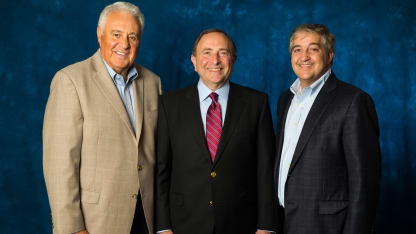
© Scott Audette/Getty Images
Dundon accompanied the Hurricanes on their trip to Tampa to play the Lightning on Jan. 9. He met with Vinik and Tampa Bay chief executive officer Steve Griggs. It was three days before Dundon was officially announced as the Hurricanes majority owner.
"They were really helpful," Dundon said. "There is obviously a similar kind of story here where they started. I think that's a pretty good blueprint for us. They invested in the community and the fan experience. They gave the hockey people the resources to do their job. There wasn't much about it that I could have disagreed with. He's obviously super bright, passionate and cares about the team and the community."
Dundon said came away from the meeting with two thoughts.
"It's good to see that if you do it you can get the results," he said.
And the other?
"[Vinik] is definitely the model," Dundon said. "No one can debate that as a guy and as a business that that's what it's supposed to look like."
So Dundon is following Vinik's model by investing in the Hurricanes with the thought of eventually investing in the area around PNC Arena in Raleigh, North Carolina.
He is working with a local developer to build a new practice facility for the Hurricanes. He plans to invest in game operations to make the fan experience inside PNC Arena world class. He said he will not get in the way of GM Ron Francis and his staff, but that he'll buoy what they're doing with financial and emotional support.
Sound familiar?
"We use Jeff as the poster child to describe what can be achievable with strong, committed ownership," Commissioner Bettman said.
All-Star Weekend represents a chance for Vinik and the Lightning to showcase their successes and their investments. If Vinik gets his way, it won't be his only chance.
He is pushing Commissioner Bettman to have an outdoor game in Tampa to be held at Raymond James Stadium, home of the NFL's Tampa Bay Buccaneers.
"We compared the weather in Tampa to the outdoor games in California," Vinik said, "and in Tampa, Florida, in the middle of February, if you pick the right time, chances are 90 percent our weather is better so there's no reason we can't have an outdoor game. I remind the Commissioner about that all the time, just as I did for the All-Star Game, and that one worked."
Don't expect him to stop until the Lightning are playing in that outdoor game, because when Vinik sets his sights on bringing something terrific to Tampa, he doesn't stop until it happens and his friends, fellow community leaders and neighbors benefit.
"When I say he's committed, it's kind of like breakfast," Yerrid said. "When you eat breakfast, you eat ham and eggs. You know the chicken was involved, but that hog was committed. Jeff Vinik gives everything he has to whatever he commits to. When a person of that talent gives his all, it inevitably leads to success and it leads to happiness for everyone around him."

















